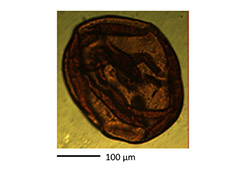Written by: Jake Wong, Sept. 24th
Many have wondered whether our neighbor planet, Mars, contains life outside of what we know of here on Earth. It would make sense, as Mars is within the proper distance away from the Sun to sustain life. However, enough research has been done to know that the stereotypical humanoid green “Martian” does not exist. Therefore, researchers are switching targets to find life: fossilized microorganisms, or “microfossil”.
Geology professor Craig Marshall and his team recently released a paper discussing how the detection of vanadium can lead to detecting life. The technique makes use of Raman spectroscopy, which reveals the cellular composition of a sample. Previously, researchers had been using Raman spectroscopy to see if a sample contains carbon chains, which all living things are made of. However, there are a lot of artificial carbon samples that may visually look like a fossil without actually being previously alive. Therefore, a new identifying factor was required, which Marshall’s team believes to be vanadium.

Example of a microfossil from Earth taken by Craig Marshall. Source
It has been previously shown that vanadium on Earth is present in things like crude oil and fossilized plants, both of which are similar to what would indicate life on Mars. This also shows that the vanadium can still be detected after extremely long periods of time and potentially under great pressure. In order to detect vanadium, Marshall is testing a technique called synchrotron micro-X-ray fluorescence, which focuses on the elemental presences in a sample.
So, if a sample has the physical characteristics of a microfossil, is shown to contain carbon material through Raman spectroscopy, and is shown to contain vanadium through synchrotron micro-X-ray fluorescence, then we can conclude that sample contains a microorganism, Marshall states. However, currently all tests on this hypothesis have been on samples from Earth. Soon, we will hopefully see this method being used on actual Martian rocks.
I believe these results are the first steps for mankind to finally make groundbreaking extraterrestrial discoveries. In the past, our testing of Martian samples was highly limited and not extremely targeted for finding life, but with these new ideas and techniques, we may find data that could lead to future colonization of Mars. I have extremely high hopes for this project and the future of our space exploration.
With investigations of Mars continuing and a Rover planned to be sent to Mars in 2020, we may find soon that we are not as alone in the solar system as we once thought.

An artist’s rendition of the Rover to land on Mars in 2020
Credit: NASA/JPL-Caltech
Read Marshall’s paper here.
